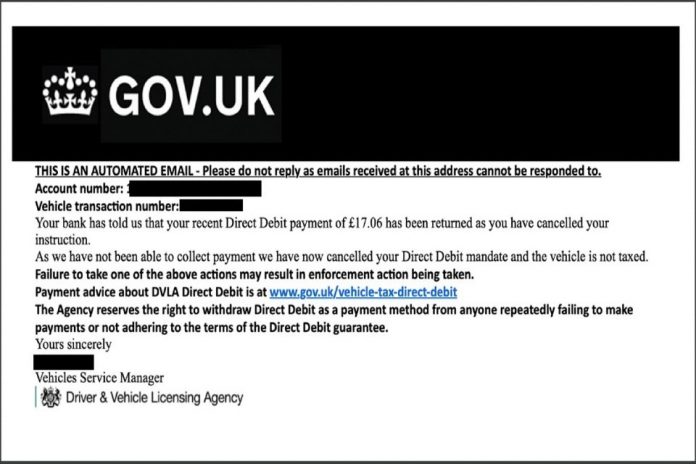The scams ask drivers to verify their driving licence details, offer vehicle tax refunds, highlight a failed vehicle tax payment and ask for bank details.
This comes as new figures released by the agency for the 3 months to September this year, show a 603% increase in reports to their contact centre of fraudulent emails, texts and phone calls, compared to the same period in 2019.
Public reports of email scams saw the biggest rise from July to September 2020 compared with same 3 months last year, jumping from 603 to 3,807 – an increase of 531%.
DVLA is reminding customers they should report any suspicious emails they receive to the National Cyber Security Centre (NCSC) through their suspicious email service.
In contrast, reports of fraudulent texts decreased from a total of 653 between July and September 2019, to 510 in the same period this year. The NCSC encourages customers to forward suspicious text messages to their network provider to investigate, on 7726 free of charge.
Customers are advised the only place to access official information on DVLA and its services is GOV.UK. The agency never asks for bank details over email and never sends text messages about vehicle tax refunds.
As well as forwarding any suspicious emails and texts, DVLA has 5 top tips for motorists to stay safe online:
- never share driving licence images and vehicle documents online
- never share bank details or personal data online
- avoid websites offering to connect to DVLA’s contact centre
- only use GOV.UK when looking for DVLA contact details
- immediately report it to the police through Action Fraud if you think you’ve been the victim of a scam
Phil Morgan, Head of Fraud Policy Investigation at DVLA, said:
These new figures demonstrate that scammers are becoming more persistent in their efforts to target motorists.
These more recent scams may at first seem legitimate, however they are designed to trick motorists into providing their personal details. We never ask for bank or credit card details by text message or email, so if you receive something like this, it’s a scam.
Customers should report suspicious emails to the NCSC immediately. Anyone concerned they may have been a victim of fraud should contact the police through Action Fraud straight away.
Sarah Lyons, NCSC Deputy Director for Economy and Society, said:
It’s important to stay vigilant to suspicious messages as we know that criminals often imitate legitimate organisations like the DVLA to make their scam seem more convincing.
Sometimes it can be difficult to tell if you’ve received an untrustworthy email or text message, but our latest guidance gives advice on how to spot the signs of a scam.
I’d also urge the public to continue to forward anything they think doesn’t look right to our Suspicious Email Reporting Service, report@phishing.gov.uk, so we can take action to remove online scams.
Notes to editors:
To report suspected email fraud contact the NCSC’s suspicious email reporting service, or email report@phishing.gov.uk. Suspicious text messages should be forwarded to 7726. This free-of-charge short code enables your provider to investigate the origin of the text and take action, if found to be malicious.
DVLA regularly publish advice on GOV.UK and across all our channels, including further top tips to help motorists stay safe online.
Fraud or cyber crime can be reported to Action Fraud by calling 0300 123 2040 (Monday to Friday, 8am to 8pm), or by using their online reporting tool, which is available 24/7.







